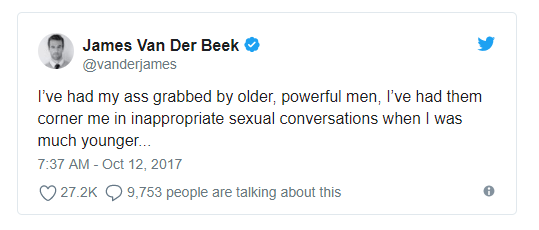The #MeToo movement has been a powerful force in helping to raise awareness of sexual harassment, especially in the workplace. It has provided a platform for those affected to speak openly about their ordeals. So far, most of the people who have come forward have been women, but there have been a few notable exceptions, including the actors Terry Crews and James Van Der Beek. Does that mean that very few men are victims of sexual harassment?
Academic research supports the idea that women do experience more sexual harassment in the workplace than men. However, emerging evidence suggests that sexual harassment against men in the workplace also exists and is on the rise.
When all reported complaints of sexual harassment to the US Equal Employment Opportunity Commission and Fair Employment Practices agencies was analysed between 1997 and 2011, most of the cases were reported by women, however, the percentage of cases filed by men between these dates increased by 15%.
In a similar long-term study of 522 workers, up to 58% of women and 37% of men reported experiencing some level of sexual harassment. This sample seems to indicate that the gap is not as wide as some believe.
Overall, sexual harassment against men is not as widely studied as sexual harassment against women; this has called into question whether the reported figures of men who have been sexually harassed may actually be much higher than currently stated. On top of this, men may be more reluctant to report sexual harassment than women. There are a number of suggested reasons for this – stigma being one of them. Many men may be too embarrassed to report sexual harassment, or they may consider it to be “unmanly” to report such behaviour.
Another reason may be perceptual differences. What is deemed to be sexual harassment may differ between men and women. A number of findings indicate that men can view certain behaviour, deemed as sexual harassment by women, as less threatening or serious – and sometimes even flattering.
It starts early
Sexual harassment against men appears to occur in educational environments prior to working life. In both middle school and high school in the US, there is evidence to suggest that boys can experience quite high levels of sexual harassment. Boys are especially likely to be victims of verbal sexual harassment.
Other findings have been observed where both men and women have experienced similar levels (61% and 62% respectively) of one or more forms of sexual harassment while at university. These studies show that many people experience sexual harassment even before working life begins.
Contributing factors
An investigation into some of the factors that may contribute to men experiencing sexual harassment in the workplace was recently explored. One of the key findings indicated that men tend to experience sexual harassment if they deviate from traditional male gender roles and are pro-feminist, regardless of their sexual orientation.
Yet it was also found that displaying pro-feminist attitudes buffered against some of the negative effects of the sexual harassment. Men tended to experience more sexual harassment if they also worked in organisations that were more tolerant of such behaviours.
Research has shown, and the #MeToo movement has highlighted, that men have a tendency to tolerate the sexual harassment of women by other men. Evidence has emerged to suggest that women may also share the same sexist attitudes when it comes to tolerating the sexual harassment of men.
In a 2015 study from Pennsylvania State University, the researchers found that there was no significant difference between males and females in terms of sexist attitudes that are known to reinforce gender inequality. This highlighted a shared set of beliefs across both sexes to justify toleration of sexual harassment. The researchers conclude that this shared set of sexist attitudes and toleration of sexual harassment may serve to enforce or maintain gender roles, for both men and women.
Impact on mental health
One consistent finding across the evidence on male sexual harassment is that it can have a detrimental impact on mental health. Men who have been sexually harassed are more likely to experience high levels of anxiety, depression and alcohol abuse. This can in turn lead to education and employment problems, such as dropping out of school, quitting work and low morale.
It seems that sexual harassment is an issue that impacts both sexes. The #MeToo movement has been very successful in helping women find their voice on this issue, maybe it’s time more men found their voice. The #MeToo movement is inclusive, after all.
Originally published on The Conversation

